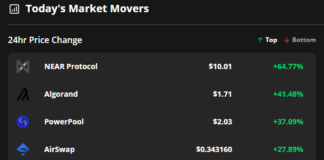BlackRock’s IBIT, one of the leading players in the Bitcoin ETF market, has recently received a significant inflow of $92.7 million, contributing to the overall growth of Bitcoin ETFs. According to data from Farside, Bitcoin ETFs collectively experienced a net inflow of $62.1 million, marking the largest increase since August 8th. This surge in inflows has propelled the total net inflow for Bitcoin ETFs to an impressive $20.5 billion.
BlackRock’s IBIT Dominates Inflows
BlackRock’s IBIT stands out as the primary contributor to the recent surge in Bitcoin ETF inflows, attracting a substantial $92.7 million. This influx of funds has significantly boosted IBIT’s total net inflow to a staggering $20.48 billion, solidifying its position as a major player in the Bitcoin ETF market. The confidence and interest shown by investors in IBIT reflect the growing demand for exposure to Bitcoin through traditional investment vehicles.
This notable inflow into BlackRock’s IBIT highlights the increasing acceptance and adoption of Bitcoin ETFs among institutional and retail investors. It also underscores the growing recognition of Bitcoin as a legitimate asset class with the potential for long-term growth and value appreciation. The influx of funds into IBIT further reinforces the positive sentiment surrounding Bitcoin and its role in diversified investment portfolios.
Fidelity Sees Modest Inflow, While Some Bitcoin ETFs Experience Outflows
In addition to BlackRock’s IBIT, Fidelity also saw a modest inflow of $3.9 million into its Bitcoin ETF offerings. While these inflows indicate continued interest in Bitcoin ETFs, not all issuers experienced positive growth. Bitwise’s BITB and Galaxy Invesco’s BTCO were the only issuers to record outflows, losing $25.7 million and $8.8 million, respectively.
The divergent performance of different Bitcoin ETFs underscores the importance of selecting the right investment vehicle based on individual risk tolerance and investment objectives. While some ETFs may experience outflows due to market dynamics or investor sentiment, others like BlackRock’s IBIT and Fidelity’s offerings continue to attract inflows, reflecting the overall optimism surrounding Bitcoin as an investment asset.
Ethereum ETFs Struggle with Outflows
While Bitcoin ETFs have been experiencing positive inflows, Ethereum ETFs have faced challenges, with a net outflow of $13.5 million. Grayscale’s ETHE, in particular, has been heavily impacted by outflows, with a significant $20.3 million leaving the fund. This outflow has contributed to ETHE’s total outflows reaching $2.4 billion, highlighting the volatility and uncertainty surrounding Ethereum ETFs.
The struggles faced by Ethereum ETFs underscore the differences in investor sentiment and market dynamics between Bitcoin and Ethereum. While Bitcoin has garnered widespread acceptance and investment interest, Ethereum continues to face challenges in maintaining investor confidence and attracting inflows. The outflows from Ethereum ETFs emphasize the need for a cautious approach when investing in alternative cryptocurrencies and highlight the importance of thorough research and due diligence.
In conclusion, the recent inflows into BlackRock’s IBIT and other Bitcoin ETFs reflect the growing interest and confidence in Bitcoin as a viable investment asset. While Ethereum ETFs continue to face challenges with outflows, the overall trend in the cryptocurrency market underscores the evolving landscape of digital assets within traditional investment channels. As investors navigate the complexities of the cryptocurrency market, selecting the right ETFs and investment vehicles becomes crucial in achieving long-term investment goals and portfolio diversification.

















